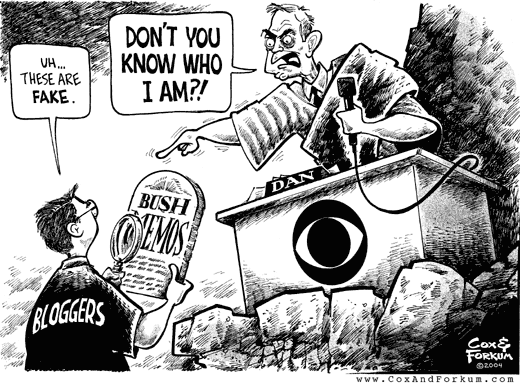Dan Rather, in a breathless “60 Minutes” piece, said he obtained documents showing that then-lieutenant George W. Bush didn’t report for a physical, and his commanding officer accused him of failing to meet National Guard standards.
Rather also interviewed former Texas House Speaker and Lt. Gov. Ben Barnes, who says that he used his influence to get George W. Bush into the Texas Air National Guard (TexANG).
But a funny thing happened on the way to the expose.
Barnes’ daughter — after saying she loves her father — called him a liar and said that Barnes told her the opposite only a few years ago. Indeed, during the 2000 presidential campaign, Barnes dismissed accusations that Bush received favoritism. Daughter Amy says that Barnes is writing a book, and spoke out against Bush to generate publicity.

Cartoon by Cox and Forkum
Barnes, it turns out, serves as a vice-chairman to the campaign of . . . John Kerry. But suppose Swift Boat Veterans for Truth co-founder John O’Neill served as a Bush campaign vice-chair? For mainstream media, that would have meant “case closed.” Indeed, the mainstream media virtually ignored the Swift Boaters’ accusations until Kerry launched his counterassault. Yet less than two months before the election, a man who works for the Kerry campaign comes forward with an accusation he earlier denied — and boom! A one-on-one with Dan Rather on “60 Minutes.”
“60 Minutes” says they obtained documents from TexANG Col. Jerry Killian’s personal files. But Killian died in 1984, conveniently unavailable to comment. Killian’s son, a former TexANG captain, says the documents appear inconsistent with his father’s high opinion of the now-president. Killian’s widow, Marjorie Connell, says her husband wasn’t a typist, hand-wrote his notes, kept no “personal files,” and the wording does not reflect her late husband’s writing style. Killian’s son and widow say they talked to “60 Minutes” before the story aired — yet Rather failed to mention them in his piece.
Former Guard commander Bobby Hodges — one of Killian’s “colleagues” CBS used to “verify” the documents — now says CBS read the documents to him over the phone, and he assumed they were handwritten notes. He told CBS the documents addressed issues he and Killian had discussed — that Bush’s failure to appear for a physical (as previously released records show) led to a flying suspension. But once he saw the documents after the broadcast, he concluded that — based on inconsistencies he noticed — the documents were bogus.
There’s more. CBS identified their “document and handwriting examiner” as Marcel Matley. Matley, however, says he only examined the signature, and could not verify the documents’ authenticity. He also qualified his examination by noting that he looked at copies, not originals. Several outside handwriting experts think the signatures fraudulent. William Flynn, considered one of the nation’s most respected document analysts, says the documents appear phony. Why? The print type and spacing are “proportional,” extremely rare over 30 years ago. (Proportional means skinny letters like “I” and “t” take up less space, common with modern computers and word processors, not so during the early ’70s.) Flynn notes that the line spacing would have been impossible on equipment available in 1973. Also, the documents showed a superscripted “th” — as in “147th” — when typewriters in those days did not automatically elevate the “th” but typed it on the same line as other letters.
Rather addressed the “th” superscript controversy by producing a 1968 document with a small “th” next to the numbers “111.” But experts say that Rather’s 1968 “proof” is not superscript, because the top of the “th” character is at the same level as the rest of the type, while superscripts rise above the rest of the type. None of over 100 records made available by the 147th Group and TexANG shows proportional spacing or the superscripted “th.”
Previously released memos show Killian signed his rank “Lt Col” or “LT Colonel, TexANG,” in a single line after his name with no periods. CBS’s memos have “Lt Colonel” on the next line, sometimes with a period, and without the customary “TexANG.” The documents show the acronym “F.I.S.” (Fighter Intercept Squadron), but military acronyms don’t include periods. They have the abbreviations “grp” (group) and “OETR” (officer evaluation review) but the correct military terminology is “gp” and “OER.”
One May 4, 1972, memo shows G.H.W. Bush’s mailing address, which G.W. Bush stopped using in 1970, and didn’t use again until late 1973 or 1974 while attending Harvard Business School. Another dated Aug. 18, 1973, cites pressure brought to bear by “Staudt” — yet Col. Staudt had retired a year and half earlier.
CBS said their “evidence” included ” . . . interviews with former Texas National Guard officials and individuals who worked closely back in the early 1970s with Col. Jerry Killian and were well acquainted with his procedures, his character and his thinking.” More “well acquainted” than Killian’s son or wife?
CBS’s Andy Rooney once called Dan Rather “transparently liberal” and advised him to “be more careful.” It appears Rather should have listened.










